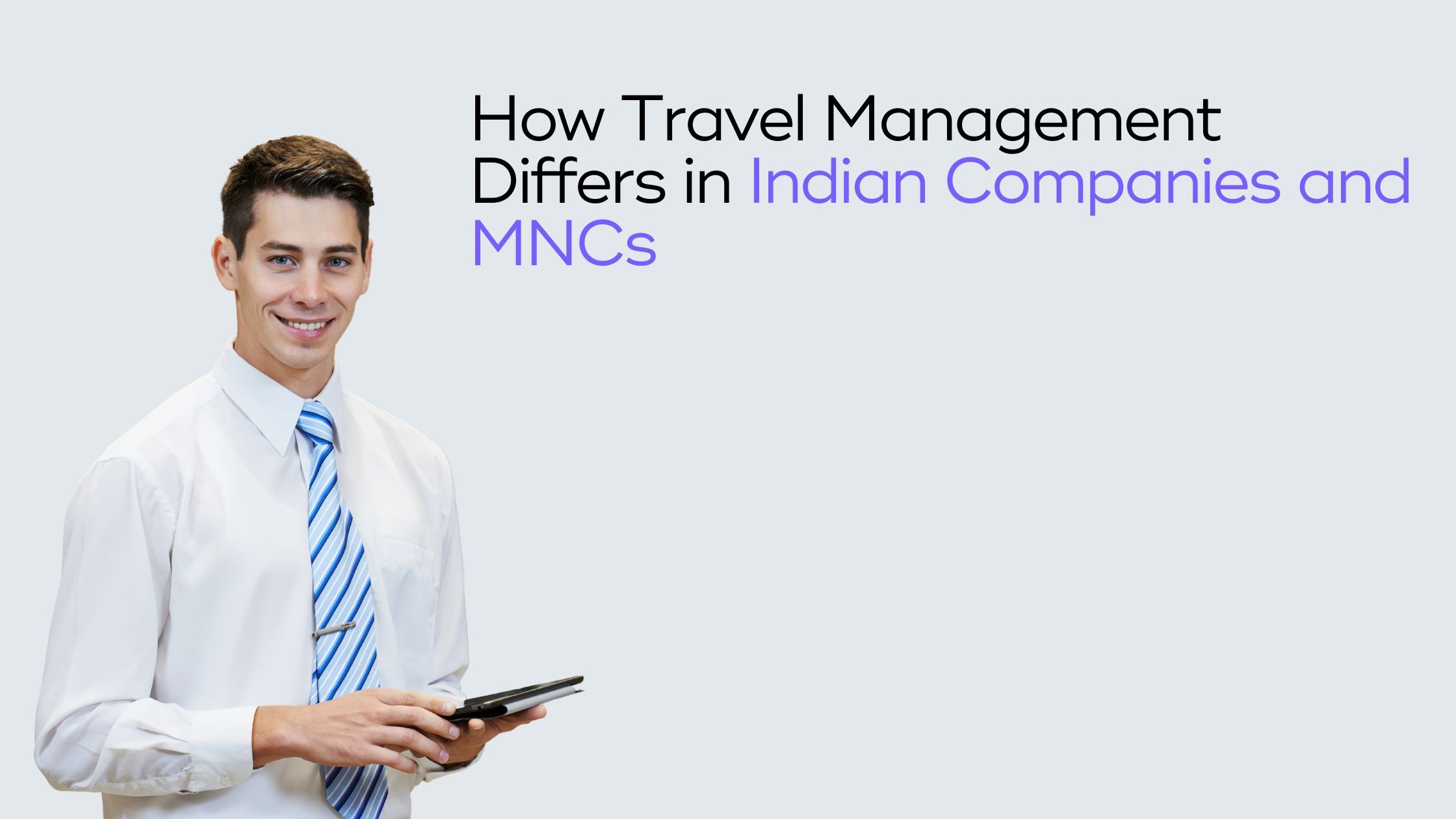As a CXO, you already understand that every function—whether it’s finance, HR, or travel—must contribute to your company’s broader strategy. But here’s the challenge: travel management in the MNC vs Startup landscape isn’t the same for everyone.
The way Indian startups handle travel is very different from how multinational corporations (MNCs) do it. And knowing these MNC vs Startup differences can help you make smarter decisions, avoid waste, and improve employee satisfaction.
Let’s break it down.
MNC vs Startup: A Tale of Two Approaches
Indian startups and multinational corporations (MNCs) approach travel management from very different angles.
Each has its own challenges, strengths, and strategic blind spots.
| Factor | Indian Startups | MNCs |
| Focus | Cost-saving, flexibility, GST compliance | Policy control, global visibility, risk management |
| Booking Style | Local agents, OTAs, manual approvals | Centralized booking tools, strict policy enforcement |
| Policy | Informal, often varies by department | Global policy, centralized controls |
| Expense Management | Reimbursement post-travel, sometimes manual | Pre-paid corporate cards, automated approvals |
| Compliance | High GST priority, less on global risk | Strong on duty-of-care, global tax and safety |
| Travel Type | 88% domestic, under 4 days(1) | Large share of international travel |
How Indian Startups Handle Business Travel
If you’re leading a startup or a rapidly growing Indian enterprise, you’re likely navigating corporate travel with agility and cost-awareness at the core.
Here’s how travel is typically managed — and where the gaps begin to show.
1. Budget-Centric Decision Making
Indian startups are highly cost-sensitive, especially when scaling.
According to the report, nearly 88% of Indian business leaders rank cost-efficiency as their top priority in travel management(1).
This often translates to:
- Mandatory economy-class travel for all employees.
- Modest hotel budgets with capped nightly rates.
- Shared or budget cab services over premium rentals.
While this mindset keeps short-term costs low, it can lead to long-term inefficiencies in compliance and employee experience.
2. GST Compliance Is Non-Negotiable
With GST input credit playing a major role in financial efficiency, compliance becomes a must.
Yet the execution is where startups stumble. This means:
- Missed input tax credits (ITC).
- Extra work for finance teams during audits.
- Higher TCO (total cost of ownership) per trip than it appears upfront.
This is a key area where MNC vs Startup travel strategies sharply diverge—startups often compromise on compliance, while MNCs make it non-negotiable.
3. Vendor Management Is Fragmented
Instead of centralized procurement, Indian startups often rely on multiple independent travel vendors:
- One for flights.
- Another for hotels.
- Yet another for visa processing or cabs.
This leads to:
- Inconsistent service quality.
- Higher dependence on personal relationships, not contractual SLAs.
- Limited room for bulk negotiation or analytics-driven optimization.
The Financial Express Corporate Travel Spend Trends Report highlights that only 25% of Indian corporate travel bookings happen through formal corporate contracts. The rest are handled through unorganized or non-integrated agents(2).
4. Processes Are Semi-Manual and Disconnected
Let’s be honest — Excel sheets, WhatsApp approvals, and PDF receipts still rule the day in many startups.
- Approvals are delayed.
- Reimbursements take weeks.
- Managers lack real-time visibility on how much is spent, by whom, and for what.
A survey referenced by The Economic Times TravelTech Insights revealed that 77% of Indian business travelers feel their company lags in adopting modern travel tech — leading to delays, frustration, and oversight risks(3).
How MNCs Manage BusinessTravel with Discipline
MNCs operate on a completely different level of process maturity, where travel is aligned with risk, compliance, sustainability, and employee well-being.
1. Global Travel Policy Enforcement
Every MNC travel program starts with a globally standardized policy.
- Seat class eligibility based on flight duration or role.
- Preferred hotel chains based on negotiated rates and safety standards.
- Mandatory advance booking windows to control cost.
2. Centralized Booking Systems
MNCs use advanced enterprise-grade platforms to manage their business travel. These systems:
These platforms:
- Handle the entire trip process from booking to expense tracking.
- Embed policy checks at every booking stage.
- Provide real-time visibility into spend and traveler status.
This gives CXOs and travel heads the ability to pull reports instantly, track compliance, and even forecast future spend by project or department.
3. Risk & Safety Are Embedded
Post-COVID, MNCs now treat traveler safety as a core compliance function, not an afterthought.
This includes:
- Real-time location tracking.
- Pre-trip risk assessment for global destinations.
- Emergency support, medical insurance, and evacuation planning.
By embedding these measures, MNCs ensure that employee well-being is prioritized throughout every journey.
4. Sustainability Is a Measurable Metric
Corporate travel is now part of ESG discussions. MNCs are aligning their travel programs with net-zero goals.
- Switching short-haul flights to rail or hybrid transport.
- Prioritizing green-certified hotels.
- Tracking carbon emissions per traveler via integrated platforms.
In the MNC vs Startup context, MNCs lead with structured sustainability goals, while startups are only beginning to factor green travel into their plans.
Common Challenges When Scaling
When a startup starts expanding or when an MNC enters India, travel becomes a pain point. Here’s why:
- Non-aligned policies between HQ and regional teams
- Duplicate vendors and uncentralized systems
- Data gaps, especially around spend, invoice status, and traveler tracking
- GST compliance failures due to global systems not syncing with Indian taxation
If not addressed, these lead to budget overruns, policy violations, and employee dissatisfaction.
So, what’s the solution?
You need a travel partner that understands both Indian complexity and global discipline. That’s exactly where CoTrav fits in.
CoTrav’s Travel Management Solution: Built for Startups & MNCs
We’re not just another booking platform. CoTrav brings a comprehensive SaaS-based ecosystem for CXOs who want clarity, compliance, and control.
Here’s what we offer:
- Flexible workflows to match your internal hierarchy — department-wise, region-wise, or global.
- GST-ready invoicing for every booking.
- Global policy compliance with local adaptability.
- Real-time dashboards for CXO-level reporting.
- Seamless integration with your ERP or HRMS tools.
- Domestic & international vendor network — no more managing 5 different suppliers.
Whether you’re approving 10 trips a week or 10,000 trips a month, we scale with you.
Your Strategic Travel Readiness Checklist
Ask yourself:
- Can your managers approve trips in real-time from mobile?
- Do you get centralized reports that track spend, vendor usage, and policy violations?
- Are all your invoices GST-compliant and digitally accessible?
- Is your team’s safety integrated into travel — not just a checklist?
- Can your system adapt to both startup agility and MNC discipline?
If the answer is “no” to any of these, your travel program may be leaking money, time, or trust.
Final Thoughts
In the evolving landscape of corporate travel, the MNC vs Startup divide is more than just operational — it’s strategic. Startups value flexibility and cost control, while MNCs prioritize policy enforcement, compliance, and global visibility.
But no matter where your business stands, one thing is clear: travel must align with your broader goals.
CoTrav bridges this gap with a platform that adapts to both startup agility and MNC-level discipline — giving you control, compliance, and clarity in one place.
Ready to make travel smarter, simpler, and scalable? Choose CoTrav — one smart move at a time.




